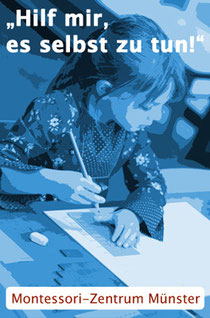Results of Empirical Research: Montessori Schools With Outstanding Achievements
The Montessori Centre of the University of Münster supports a commission of the Montessori Association including Dr. Reinhard Fischer (University of Münster), Ms Barbara Stein (Montessori Primary School Bonn) and Dr. Wilhelm Suffenplan (formerly University of Cologne). Using the results of the VERA studies of different federal states, this group has investigated the level of performance of Montessori primary schools compared to regular schools. The results for Montessori primary schools in North Rhine-Westphalia in comparison with regular schools have now been published by Dr. Wilhelm Suffenplan (Am Ludwigsacker 6d, 50374 Erftstadt, Tel/Fax: 02235/3340, w.suffenplan@gmx.de) in the double issue 1/2-2006 of the “Montessori” journal.
The analysis refers to the data collection as part of the “comparative tests (called VERA)” in 2004, where achievements of students from the fourth grade in mathematics (arithmetic, geometry, calculations concerning practical problems) and German (reading, writing — on a given topic — , orthography, contemplation of language) were examined. In this survey the involved classes were divided into four context groups with especially favourable as well as unfavourable learning conditions. The criteria for the allocation to the four groups were above all the class size as well as the boys and girls’ individual and socially caused learning difficulties. The comparability of the Montessori school classes and the regular classes was secured by careful analyses. 80 Montessori classes from 12 schools with 663 students from the fourth grade were involved.
All in all, in almost half of the 28 surveys (in the seven learning/study fields and four context groups) a significant superiority of the Montessori classes was found. The other surveys showed a trend towards superior achievements in five surveys, performances of equal value in eight surveys and in only two surveys weaker performances of the Montessori classes in relation to the corresponding groups of regular schools.
The superiority of Montessori schools was highly evident in the mathematical fields. One should also mention that advantages arose for the Montessori schools in German in both context groups with the more unfavourable learning conditions. Obviously, the Montessori Method also has a beneficial effect on boys and girls in difficult learning situations. The two weaker achievements have been made by the two groups with more favourable learning conditions in the field of writing and orthography. An important reason for these learning successes in Montessori schools probably is that the Montessori Method fosters students individually and gives them the possibility of learning by doing and comprehensive learning.
These learning conditions also offer special opportunities for the fostering of highly gifted children — as proven by a dissertation of the former colleague and now primary school teacher Esther Grindel, which was supported by the Montessori-Centre of the University, examining the learning processes of highly gifted children in the Free Work of the Montessori Method.
In order to classify these results, the findings of the international comparative survey IGLU/IGLU-E of 2002 can be consulted. This survey examined the mathematical (arithmetic, geometry and calculations concerning practical problems) and reading competence of students from the fourth grade. The students from Germany and from NRW performed averagely in this comparison. This leads to the conclusion that even from an international point of view a considerable level of achievement has been reached in Montessori schools in NRW.
These results concerning achievements of Montessori schools agree with older surveys in Germany and with current international empirical surveys. Accordingly, an empirical survey published in the USA at the end of September 2006 in the internationally renowned journal “Science” (“Evaluating Montessori Education”) shows that twelve-year-old Montessori students performed equally in mathematics as well as more diversely and more creatively in the language field (essays) and equally in the other learning/study fields. It is also important to mention that this survey shows a marked superiority of the twelve-year-old Montessori students as compared to regular students according to their social competence that has already been found with five-year-old Montessori children. Since the examined groups had been put together at random, other influencing factors like the parental home had been reduced to a large extent. This makes the results of this survey even more significant.
A different survey from the USA tested a group of about 200 students that had gone to Montessori primary schools in the fields of language and mathematics/science after a five years’ visit to a regular secondary school in comparison with a group of fellow students who had not visited Montessori primary schools. The research showed that the Montessori students achieved the same results in the language field, but better results in the field of mathematics/science than their fellow students. This refers to a long-term effect of the Montessori education that even remains when the students visit regular secondary schools. The particular findings of this American survey have been published in German in the issue 1/2-2006 of the “Montessori” journal.
In the view of the Montessori Method such positive results in the field of intellectual achievements with Montessori students are indeed welcome, but they are not an end in themselves. They are rather only the means — even if an important one — for the education of the whole personality on his way to an independently thinking, emotionally balanced and responsibly acting member of a democratic society.

 Kompetenz in Montessori-Pädagogik
Kompetenz in Montessori-Pädagogik
